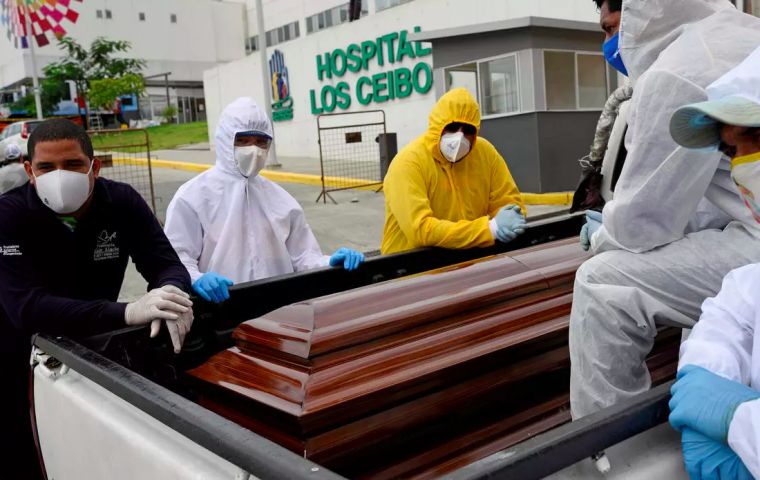MercoPress. South Atlantic News Agency
Overwhelmed by the pandemic, Ecuador on the cliff of a US$ 17bn default
 The coronavirus outbreak has overwhelmed health and funeral services in Guayaquil, where authorities have built emergency cemeteries and families had to store relatives’ bodies at home. REUTERS
The coronavirus outbreak has overwhelmed health and funeral services in Guayaquil, where authorities have built emergency cemeteries and families had to store relatives’ bodies at home. REUTERS  For president Moreno boosting funds to fight the virus could conflict with efforts to pay creditors and implement austerity measures to balance a gaping fiscal deficit.
For president Moreno boosting funds to fight the virus could conflict with efforts to pay creditors and implement austerity measures to balance a gaping fiscal deficit. The coronavirus outbreak in Ecuador is increasing pressure on President Lenin Moreno to default on US$ 17 billion in debt and devote more resources toward fighting a pandemic that has left bodies in the streets of the nation’s largest city.
The coronavirus outbreak, among Latin America’s worst, has overwhelmed health and funeral services in the southern city of Guayaquil, where authorities have built emergency cemeteries and families had to store relatives’ bodies at home for days because of delays in collection.
For Moreno – a former ally of Ecuador’s former leftist leader Rafael Correa who has tacked to the center since taking office in 2017 – boosting funds to fight the virus could conflict with efforts to pay creditors and implement austerity measures to balance a gaping fiscal deficit.
Moreno says Ecuador will not default and will cover expenses with US$ 3 billion from multilateral agencies and China, but the government only has firm commitments for US$ 580 million.
And with some Ecuadorean bond yields now topping 90%, markets appear skeptical that more funding will arrive – leaving default looming large.
The oil-producing country has had a troubled relationship with creditors since 2008, when it declared a moratorium on payments on some bonds. That left Ecuador frozen out of debt markets for six years, though Correa inked billions of dollars of oil-for-loan deals with China.
While Moreno sought to woo investors through market-friendly reforms, Ecuador’s bonds plummeted late last year after he walked back plans to lower gasoline subsidies due to violent protests.
Last month’s oil price plunge pummeled public finances, which are further pressured by a halt in crude exports after a landslide caused two pipelines to rupture last week.
The government has already invoked a 30-day grace period on US$ 200 million in interest due on March 23, and asked holders of nine bonds maturing between 2022 and 2030 to defer interest payments to free up US$ 811 million.
Ratings agency S&P this week downgraded Ecuador to selective default on expectations of a missed interest payment. The 2022 bond is trading around 32 cents on the dollar.
Finance Minister Richard Martinez acknowledged the level of debt was “inviable” but insisted the country’s strategy is to avoid default. While it deferred the US$ 200 million last month, the government paid US$ 325 million in principal on its 2020 bond.
“Critics ask why we paid,” Martinez told local television on Monday. “We did that not because we are crazy, but because we do not want to expose the country to negative experiences.”




Top Comments
Disclaimer & comment rules-

-

-

Read all commentsSurprisingly, MP's know-it-all commentators are not coming to criticize the disastrous failure of Ecuador's latest neo-liberal apprentice.
Apr 19th, 2020 - 04:41 pm +1Which comes up to show the failure of an ideology that has kept Latin America in the Dark Age.
Socialist ideologies lead to a golden age.
Apr 20th, 2020 - 04:24 am 0Free markets are a Dark Age.
“Free markets are a Dark Age.”
Apr 21st, 2020 - 10:53 am 0After being run for a few years by free market governments, both Argentina and Ecuador are on the verge of default. If the shoe fits...
Argentina now has a socialist government and a low death rate from coronavirus. Ecuador still has the free-marketers in charge, and Ecuador has bodies lying in the streets.
Commenting for this story is now closed.
If you have a Facebook account, become a fan and comment on our Facebook Page!